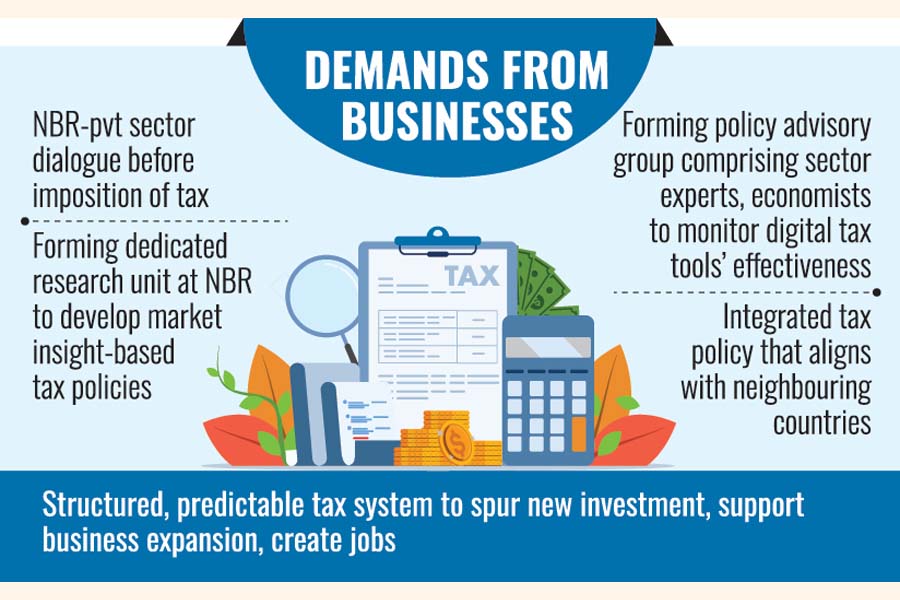
Published :
Updated :

Top executives from multinational corporations (MNCs) and local business upshots suggest dialogue between the revenue authority and the corporate sector before taxation as they feel high taxes hamper business and investment.
They also point out that high tax incidence also promotes tax-dodging, while calling for lowering tax rates and casting wide tax nets to augment government revenue receipt.
Such business-government dialogues can bring about a balance where the National Board of Revenue (NBR) meets its tax targets while businesses can operate sustainably without excessive tax burdens.
Speaking at a meet Wednesday, the local and foreign corporate bosses were critical of the existing high effective tax rates in Bangladesh, arguing that the heavy tax burden hampers business operations.
The executives suggested establishing a dedicated research unit within the NBR. They proposed providing adequate industry insights for the research unit to the tax authority to enhance tax-policy formulation and impose rational tax.
They also seek a more predictable tax system to encourage new investment, support business expansion, and generate employment opportunities.
The business top brass were speaking at a programme styled 'navigating tax policy framework: impact and priorities for critical sectors'.
Policy Exchange Bangladesh organised the programme at a local hotel, with NBR chairman Md Abdur Rahman Khan attending as chief guest.
Dr M. Masrur Reaz, chairman and CEO of Policy Exchange Bangladesh, made welcome address while Director-General of Bangladesh Investment Development Authority (BIDA) Md Ariful Hoque made concluding remarks.
Speaking at the event, the NBR chairman identified a lack of governance as the primary issue affecting Bangladesh's tax system.
"There is no accountability at present, but digitisation can enhance efficiency, ensure good governance, and create a hassle-free tax administration," he replied to the corporate bosses about perennial hassles in the tax administration.
He stressed the need for improving governance through digitisation as a key priority.
"This [poor governance] is the main factor, and we are working to overcome it," he went on.
Highlighting Bangladesh's rising debts, he warned: "If tax mobilisation does not improve, the debt situation may become unsustainable."
He also acknowledges that tax leakage is a major concern for the tax mobilisation. "If we can stop tax leakage, tax collection could increase by Tk 500 billion to Tk 1.0 trillion."
Pran-RFL Group Chairman Ahsan Khan Chowdhury emphasised the need for a structured dialogue between the private sector and the revenue board.
He argues that better communications could help NBR optimise tax collection without negatively impacting industries.
"You first have to understand your challenges so that we can also help you."
He further suggests that regular discussions between the NBR and various business sectors could yield better outcomes.
LafargeHolcim Bangladesh CEO Iqbal Chowdhury proposed setting up a dedicated research wing within the NBR to develop tax policies based on market insights.
"There are different industries. If you have a full picture of the economy, you can determine ideal revenue levels for each sector," he notes.
He also recommends forming a policy-advisory group consisting of sector experts and economists to monitor the effectiveness of digital tax tools.
"Automation is the future," he concludes.
President of MCCI Kamran T. Rahman stressed the importance of tax reforms, calling for an integrated policy aligned with neighbouring countries.
"Our VAT system, with multiple high rates, is less competitive than in comparable countries," he notes.
He argues that high taxes limit business expansion and reinvestment. "Lower tax rates and automation can improve industry compliance and increase tax collection."
BAT Bangladesh Managing Director Ms Monisha Abraham pointed out the challenges facing the tobacco industry despite being the largest tax contributor. It contributes around 12 per cent of tax collection.
"Any additional burden on this sector will directly impact 4.4 million people," she told the meet.
She further highlighted disproportionate tax contribution: "Despite holding only 20 per cent of the market share, we pay 80 per cent of the sector's total tax."
She urges the NBR to ensure data transparency for a level playing field.
Nestlé Bangladesh Ltd company secretary and head of legal and taxation Debabrata Roy Chowdhury raised concerns about the high effective tax incidence.
"For example, while the tax and VAT rate may be 25 per cent, the effective tax burden often reaches 40 per cent," he said.
He calls for a structured and predictable customs-duty rate, arguing that inconsistencies deter investment.
JTI Bangladesh Managing Director Paul Holloway advocates for gradual and predictable tax rates, emphasising the importance of open dialogue between businesses and the board of revenue.
"Such discussions will help NBR achieve its revenue goals while ensuring businesses can operate sustainably," he said.
President of ICMAB Mahtab Uddin Ahmed recommends expanding the tax base rather than increasing tax rates which could otherwise burden industries.
He also raised concerns about audit quality, citing the limited number of auditors relative to the growing number of corporate entities.
Policy Exchange Bangladesh presented the keynote at the programme. Hasnat Alam, economist, Policy Exchange Bangladesh, gave the presentation on the reform agenda.
The paper states that high taxes lead to growing evasion and Illicit activities, causing revenue loss
It mentions that Bangladesh's 32.5-percent corporate tax rates are higher than that in India (25 per cent) and Sri Lanka (24 per cent), potentially impacting business growth, investment and tax compliance.
"Growing tax losses due to the shadow economy highlights persistent tax evasion and informal economic activities."
The think-tank suggests introducing a unified tax code to reduce compliance costs and encourage voluntary participation.
It recommends simplification of tax-reporting forms to encourage compliance and reduce administrative burdens.
Also suggested is that the bonded-warehouse licensing should be online within 15 days to streamline warehousing and supply-chain operations.
It further recommends speeding up VAT-refund processes and reducing correction-procedure time from 36 to 16 hours to ensure timely refunds.
jasimharoon@yahoo.com and nsrafsanju@gmail.com


 For all latest news, follow The Financial Express Google News channel.
For all latest news, follow The Financial Express Google News channel.